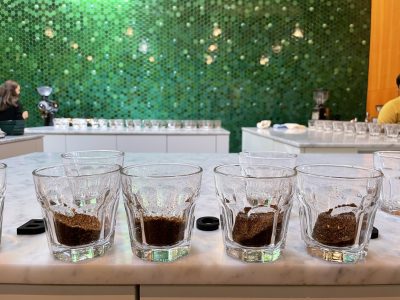If your newsfeed is (like mine) bent by algorithm towards coffee articles, you’ve probably noticed an uptick in reporting about the safety of decaffeinated coffee recently.
This is because the Food and Drug Administration (FDA) submitted a petition to amend food additive regulations to remove solvents, including Methylene Chloride, from products available for consumption.
The Facts
There’s little question that the chemical is dangerous: Methylene Chloride is a suspected carcinogen and classified as a hazardous waste, and its industrial production is environmentally harmful. For the latter reasons, Royal Coffee has abstained from trading MC decafs since 2016.
MC Decafs, also known as the “European Method” are ubiquitous in the industry, but the truth about whether they are dangerous for human consumption isn’t as simple as the media might make it seem. There are two important reasons consumers are unlikely to experience health issues: first, the use of MC is indirect in decaffeination – the solvent never comes in contact with the coffee product itself. Second, MC is highly volatile, and residual chemicals in the unroasted coffee are mostly destroyed during roasting.
Proposition and Reaction
The FDA’s proposed changes would effectively ban MC decafs for consumption in the US. The chemical is already banned in other products, like paint removers (as of 2019). Comments are no longer being accepted on the filing, but it isn’t clear what timeline we can expect from the FDA for implementation. There’s surely an inscrutable layer of bureaucratic red tape lying between us and the proposal’s current state.
California is also considering a state-wide ban of MC decafs. The bill, if adopted as it is currently written, would go into effect in 2027 (according to Daily Coffee News).
Unsurprisingly, among the most vocal opponents is the trade group advocate National Coffee Association (NCA), claiming that “banning the most common decaffeinated coffee… would unjustifiably deny decaffeinated coffee drinkers’ access to a safe product.”
Advice For Roasters
Our recommendations remain largely the same as they did four years ago for roasters and consumers:
If you’re currently drinking or roasting MC decafs, don’t panic. The reason Royal encourages you to switch is not because drinking these decafs are hazardous (they’re almost certainly not) but because the industrial production of Methylene Chloride is dangerous for the environment and for those who handle it during its manufacture.
There’s also never been a better time to switch to chemical-free Water Process or low-environmental impact Ethyl Acetate (aka “Sugarcane Process”) decafs. They’re priced similarly, taste great, and bear none of the stigmas of MC. We’ve staked our reputation on it, feel free to join us.
Further Information
Check out our chemical-free and sugarcane decafs: “Royal Select” offerings are decaffeinated by water process, while “EA Coffein” or “EA Natural” use Ethyl Acetate.
You can learn more about caffeine, Methylene Chloride, and the history and process of decaffeination from my article in the Royal Blog.
You can also check out the Clean Label Project’s report on the topic, whose research stimulated a good bit of discussion on the topic a few years back.



We have been using your Mountain Water decaf for years now and love it. ne time I had a specific Guatemalan I liked a lot. the net year it was also in offer as your Royal Select decf. At a cuppping a new pitentio=al customer cupped it and firmly declared THAT”S NOT DECAF”. I assured her it was, indeed. Not long after I supplied this one to a shop I serviced at the time. New first time customr came in the next day and ordered a drink based on decaf. I am told she tasted it and started to ge chuffed.. I ORDERED DECAF. Ma’am that’s what we served you. No it can’t be. It tastes too good!!! Bi of a kerfuffle started brewt=ing.. owner came round from the back part of the sop and assured her this IS decaf. I pay a LOT of mney for that coffee because it IS so good. She, somewhat de-ruffled, declared “all right, but if I dont sleep tinight I’m going to be back in the morning and will have some words for you!!! Owner said that’s fine… you won’t be back.
Well, she was…. ordered the same drink again, became a regular daily customer on THAT decaf. My customer was very happy…..